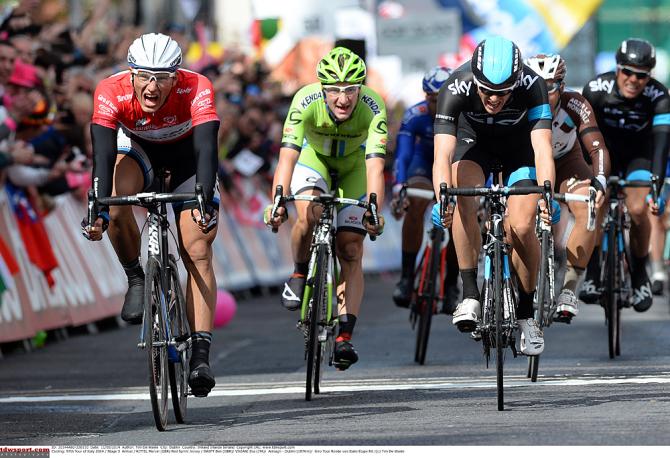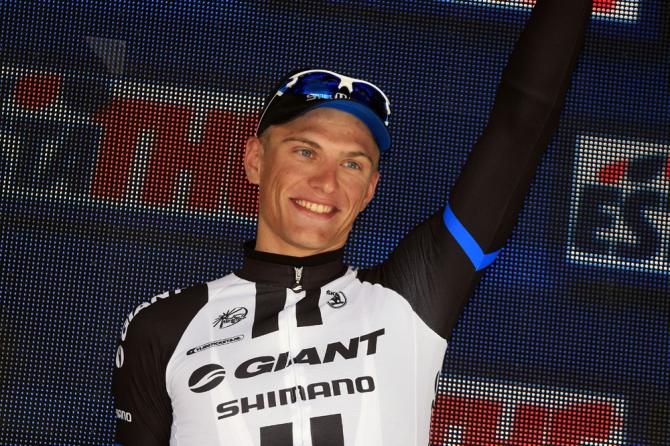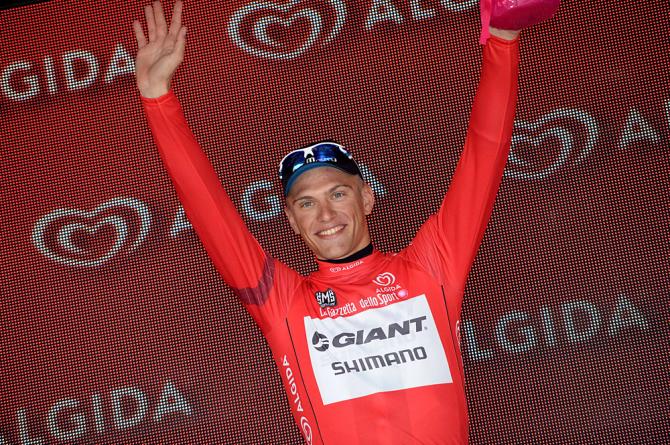Giro d'Italia 2014: Kittel delivers in Dublin
German wins second successive sprint stage



If Marcel Kittel’s victory in Belfast the previous day had been a case of painting by numbers, his win in Dublin at the end of stage 3 of the Giro d’Italia was something of a masterpiece, as he made up a huge deficit in the finishing straight to overhaul Ben Swift (Sky) at the death.
When the peloton swung onto Merrion Square and past the National Gallery of Ireland, the German found himself lying ten places off the front and seemingly out of the picture for the sprint. Even with 200 metres remaining, Kittel was still very much in the background, but somehow he summoned the strength to drag himself back into contention. Although his Giant-Shimano team had taken care to prepare the canvas ahead of the finale, mindful of the technical run-in to Dublin, Kittel found himself squeezed out of position just after the bunch had crossed over the Liffey.
“Afterwards, I was in maybe 12th or 13th positon for the sprint, really far back, but fortunately I was on the wheel of [Nacer] Bouhanni, who was probably in the same situation and trying to close gaps in front. Then I saw the finish, I knew how far it was and I just tried everything.”
Kittel only passed Swift inside the final 50 metres, yet his turn of pace was such that he had almost an entire bike length in hand by the finish. Not that the win had come easily to the German – rather than celebrate for the television cameras, his first act on crossing the line was to dismount and sit on the tarmac, stricken from his effort on that final false flat.
“I sprinted as hard as I could and I sprinted for much longer than I would normally do because I was not in a good position with 300 metres to go,” Kittel said. “I think I almost attacked instead of sprinted. That took a lot of energy and that’s the reason why I was on the ground and had to take some rest at the finish.”
Kittel was initially coy when asked if he knew what his power output had been in that frenetic finishing sprint – “I don’t know anything about the data from today and if I did know I’d keep it to myself,” he joked – but later explained that he had practical reasons for guarding his data so jealously.
“If someone knows my threshold or power output in the sprint, it’s possible to create a strategy around it. If other teams know how many watts I push uphill they might ride a couple of kilometres per hour faster and make sure I’m dropped, so that’s why I want to keep it to myself.”
Get The Leadout Newsletter
The latest race content, interviews, features, reviews and expert buying guides, direct to your inbox!
Big picture
Shortly before Kittel entered the press room at Lansdowne Road, pink jersey Michael Matthews (Orica-GreenEdge) said that he agreed with the consensus that the German is currently the best sprinter in the world. Kittel has now won stages in all three grand tours, his running total of victories for this season is already at seven, and there is a sense that he still has room for improvement.
“It’s always important for me in my development as a rider to see improvements, not just in my shape, but by improving the team and the mental approach for myself – how I handle the pressure and deal with stress,” Kittel said. “I think I have plenty of things I can improve, not only legs wise.”
In theory, Kittel’s burgeoning palmares and the good-natured ease with which he handles life in the limelight should also help to improve the lot of German cycling, which lost so much momentum following the doping scandals that engulfed the T-Mobile and Gerolsteiner teams. Yet in spite of Kittel’s success – and that of Tony Martin and John Degenkolb – the German broadcasters continue to all but ignore professional cycling. “It’s not my job to make them come back – all I can do is win races,” Kittel said.
Indeed, if he keeps winning races at this rate, Kittel could put a significant down payment on the red jersey of points classification leader in the next week. Given the mountainous sting to this Giro’s tail, however, Kittel might well find that tunic something of inadvertent burden. He refused to be drawn when asked if he would abandon the Giro early in order to prepare for the Tour de France and his anticipated showdown with Mark Cavendish.
“I will take it by day and I will see how far I can come. For me it’s a big honour to wear the jersey and I have big motivation in the next days to go for the sprint,” Kittel said. “But I’ve said it already, maybe the Giro takes the decision for me and I’m out earlier than I want to be.”

Barry Ryan was Head of Features at Cyclingnews. He has covered professional cycling since 2010, reporting from the Tour de France, Giro d’Italia and events from Argentina to Japan. His writing has appeared in The Independent, Procycling and Cycling Plus. He is the author of The Ascent: Sean Kelly, Stephen Roche and the Rise of Irish Cycling’s Golden Generation, published by Gill Books.